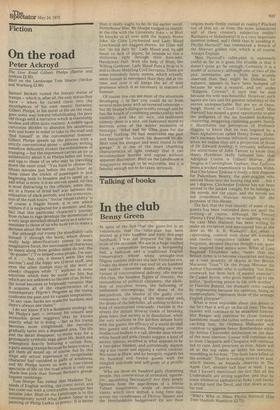In the club
Benny Green
In spite of the fact that the guest-list is so voluminous that the table-plan has been printed as a two hundred and forty five-page hardback, I was not prepared for the sheer scale of the occasion. We are in a huge vaulted room, a compromise between a banqueting hall, a ballroom and a traditional English conservatory whose white wrought-iron filigree vanities indicate the late Victorian era. Under the dome of its vast roof sit six hundred and twelve clamorous diners offering every variant of conversational delivery, idle teacup chit-chat, the headiest flights of rhetoric, the orotundities of political chicanery, the ululation of truculent lovers, the bellowing of uniformed nincompoops, the drone of the panjandrum, the bluster of the guilty civic conscience, the cooing of the man-eater and..., the drone of the ladykiller, all uniting to form a kind of murmurous crescendo. Outside in the streets the distant drowsy tinkle of breaking glass hints that society is in dissolution, while the very scullions in the kitchen debate hotly with the guests the efficacy of a world divided into guests and scullions. Presiding over this intellectual bedlam is a tall, slender man whose white beard and pink, cheeks suggest a kind of ascetic Silenus, swathed in what appears to be a two-piece blanket, and contentedly munching a nut rissole and sipping a carrot cocktail. His name is Shaw, and he benignly regards his six hundred and twelve guests with the mingled solicitude and self-pride of a prolific parent. Who are these six hundred gaily chattering people, this convocation of animated, egocen,tric, squabbling fascinators? Are they simply figments from the pipe-dream of a febrile Fabian imagination, wisps of intellectual vanity which once drifted, a long time ago, across the cloudscapes of Fitzroy Square and the Hertfordshire hedgerows? Or are their origins more firmly rooted in reality? Plucked out of thin air, or from the more substantial soil of their creator's subjective reality? Ruritania or Hobohemia? It is a very important question indeed, and I think that in avoiding it,
Phyllis Hannoll'. has committed a breach of the Shavian golden rule, which is of course, Always Explain.
Miss Flartnoll's table-plan is extremely useful as far as it goes; the trouble is that it doesn't quite go far enough. Certainly it is a model of accuracy, although one or two of the plot summaries are a little less acutely observed than they might be. Dubedat, for instance, appears to have been bumped off because he was a wastrel, and yet under "Ridgeon, Colenso'", it says that he died because his wife was beautiful. However, such lapses are rare and the general reliability of the entries unimpeachable. But are we in Osnaburgh Street or Cloud Cuckoo Land? Miss Hartnoll has missed a great opportunity to plot the pedigrees of the six hundred bickering, chattering, sniggering clattering guests. Surely it illuminates our perception of Professor Higgins to know that he was inspired by a New-Alphabeticist called Henry Sweet; Dubedat's excesses become infinitely more pathetic when we realise they are a projection of those of Dr Edward Aveling; it certainly enhances the attractions of John Tanner to know that Henry Hyndman really fathered him, that Adolphus Cusins is Gilbert Murray, that Sergius is Cunningham Graham, that Epifania bears a wicked resemblance to Beatrice Webb, that Chichester Erskine is really a thin disguise for Pakenham Beatty, the poet-pugilist who enticed Shaw into the boxing ring and ... but I see I digress. Chichester Erskine has not been invited to the junket tonight, for he belongs to the novels, not the plays, and the novels are not considered Shavian enough for the purposes of this dinner.
The fact that the true identity of some of the guests has been concealed does not spoil the evening • of course, although Mr Trotter (Fanny's First Play) must be wondering why in his case Miss Hartnoll has been willing to make an exception and announced him at the door as Mr A. B. Walkeley. But what a captivating, comical mob these six hundred and twelve compulsive talkers are. I had forgotten, devoted Shavian though I am, quite how inspired their antics were. What of Lord Reginald Fitzambey who "hears that the British Army is to become vegetarian and buys up a vast quantity of shares in the British Macaroni Trust"? Or the Prime Minister Sir Arthur Chavender who is suffering "not from overwork but from lack of mental exercise". Or Cashel Byron, who gives himself up to the police, "preferring prison to life with mother", or Flawner Bannal, the dramatic critic valued by impresarios because his opinions, being so commonplace, "represent those of the average English playgoer".
What is most enjoyable about this dinner is the fact that it will go on for all time. The nut rissoles will continue to be munched forever. Mrs Banger will continue to chase General Sandstone round the tables without ever quite catching him; Sir Orpheus Midlander will continue to appease Senor Bombardone while Sir Arthur Chavender deliberates on the date of the next election. Caesar will continue not to trust Cleopatra and Cleopatra will continue not to care. And, prescient as ever, Adam will sit at the top table, as befits his seniority, mumbling to his host, "The fools have killed all the animals". There is nothing more to be said, which means, as Amanda observes in The Apple Cart, another half hour at least. I see that I haven't mentioned the fact that all the Undershafts are sitting together, and that by some whimsical alphabetical fluke Lord Derby is sitting next the Devil, and that down at the far end . . . .
'Who's Who in Shaw Phyllis Hartnoll (Elm Treeil-lamish Hamilton £2.75)


























 Previous page
Previous page